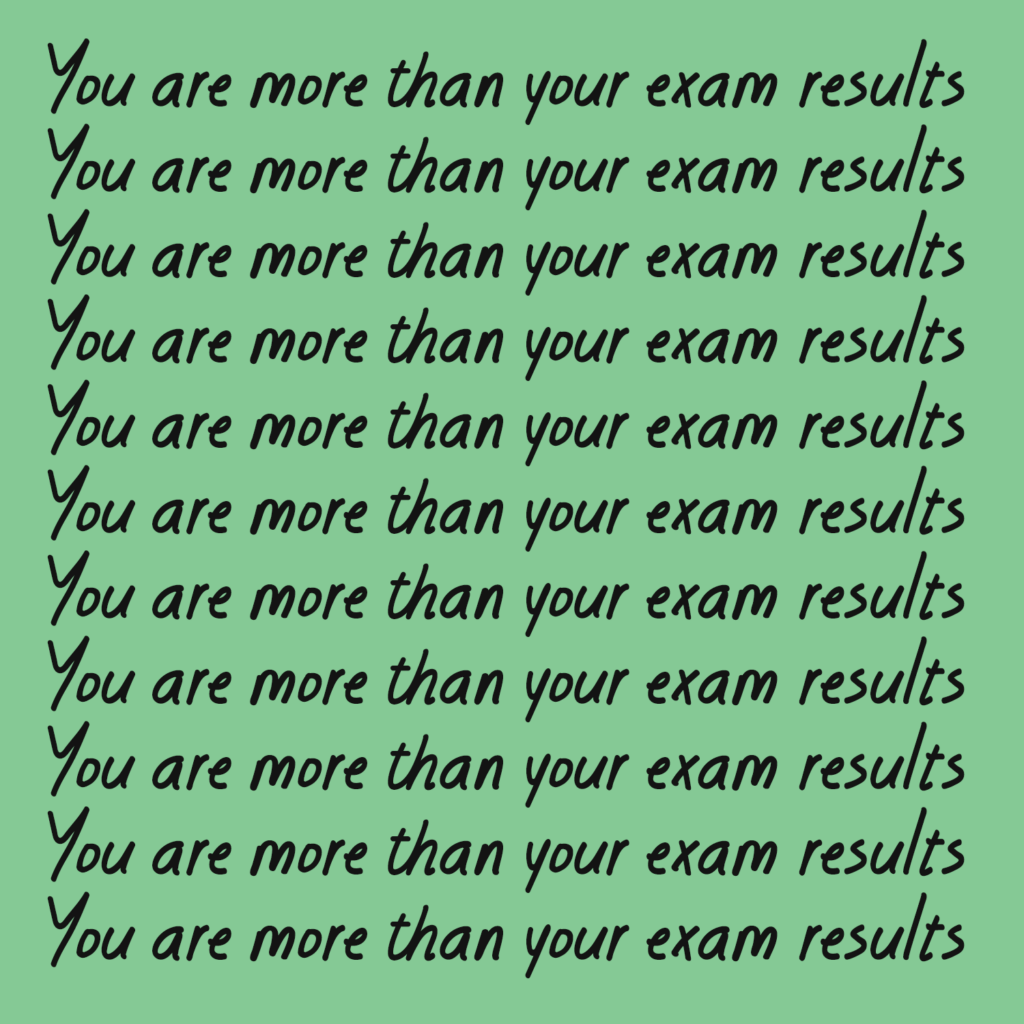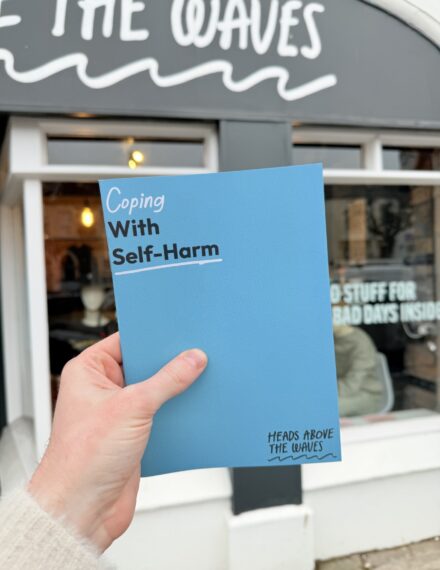Dealing with Exam Anxiety
The stress of exams, and the anxiety that comes with it can leave you feeling overwhelmed and panicky. And that sucks. So let’s explore some ideas for how you can help keep that exam anxiety in check.
Pro tip: all of these things are gonna be useful in your every day life too – so def worth practising them beyond just exam season!
Recognise What You’re Feeling:
But before we get into it, let’s make one thing clear: feeling anxious before a test is totally normal. Heck, it can even beneficial in small doses. Anxiety signals that something important is at stake, which can motivate you to prepare. But when stress becomes overwhelming, it hurts more than it helps.
Remind yourself that anxiety does not mean you’re incapable. It simply means you care. Try to observe your anxious thoughts without judgment, and acknowledge them for what they are (just thoughts, not destiny).
Test anxiety often stems from catastrophising – blowing the consequences out of proportion . Simply naming the fear (“I’m afraid of failing math and disappointing my parents”) can take some of its power away. Which means you can address it a bit more rationally.
1. Practice Calming Breathing Techniques
When anxiety strikes, one of the quickest ways to soothe your nervous system is through deep breathing. Exam nerves often kick our bodies into “fight-or-flight” mode. When we’re in this state, our breathing becomes fast and shallow, and your heart races. So by consciously slowing down your breath, you can trigger the opposite reaction: the parasympathetic “rest and relax” response that calms you down . Research shows that deep belly breathing can significantly lower stress hormone levels and reduce anxiety.
How to do it: Take a slow, deep breath in (feel your belly expand), then breathe out slowly. Repeat. Simple. Focus on making your exhales long and steady – this tells your brain you’re safe.
Something we like to do is box breathing. Inhale for 4 counts, hold for 4, exhale for 4, hold for 4, and repeat . As you do these exercises, try to relax your muscles too – maybe roll your shoulders or unclench your jaw, which often tenses up when we’re stressed .
2. Ground Yourself in the Present Moment

Anxiety often pulls our minds into a whirlwind of “what ifs.” Grounding techniques can halt that spiral by anchoring you to the here and now. The technique we’ve been shouting about for years is Grounding 5-4-3-2-1. It’s super simply, you name:
- 5 things you can see around you (the classroom door, your pen, a spot on the wall – any visible details) ,
- 4 things you can touch (your feet on the floor, the texture of your shirt, the cool desk under your hands) ,
- 3 things you can hear (perhaps the hum of ventilation, distant footsteps, or even your own breathing) ,
- 2 things you can smell (maybe your freshly sharpened pencil, or the fabric softener on your shirt) ,
- 1 thing you can taste (even if it’s just the lingering mint from toothpaste or gum) .
By going through your senses one by one, you redirect your mind away from anxious thoughts and toward your immediate environment. This exercise effectively grounds you in the present so that your brain isn’t running away into worry about the future or dwelling on the past.
The underlying message you’re sending yourself is: I am here, right now. I am safe. This helps break the cycle of panic and brings a sense of control back to you.
3. Shift Your Mindset and Self-Talk
Our own thoughts can be our worst enemy or our best coach when it comes to exam anxiety. A big part of managing anxiety is learning to catch those negative thoughts and gently change the narrative .
Start paying attention to the script in your head when you’re stressed about exams. Are you telling yourself things like “I’m going to fail,” “I’m just not good at this,” or “If I mess this up, my life is over”? These thoughts can send anyone into a tailspin of panic. The key is to recognise when you’re thinking this way and challenge those thoughts – basically, talk back to them with a more balanced, encouraging perspective.
For example, instead of thinking: “I have to get top marks or I’m a failure,” try reframing it to:“I’ve prepared as best I can, and I’ll do my best – even if I don’t get a perfect score, it’s not the end of the world.” .
Rather than: “I feel stupid and hopeless at this subject,” remind yourself: “I am capable – one exam won’t define my intelligence or worth.” These kinds of mindset shifts, grounded in self-compassion and reality, can seriously dial down your anxiety.
You wouldn’t tell a friend “You’ll surely fail,” right? You’d probably say something much more encouraging. Do the same for yourself.
Something to try: You might find it helpful to actually write this stuff down. Sometimes just the process of getting your thoughts out of your brain and onto paper in front you can help give you perspective, or even clarity.

4. Take Care of Your Body
It’s hard to have a calm mind if your body is on edge. Physical health and mental health are tightly connected, especially when it comes to stress. By taking care of your body’s basic needs, you build a stronger foundation for managing anxiety.
Prioritise sleep
Getting enough restful sleep is one of the most effective anti-anxiety measures (and it’s free!). Unfortunately, when exams loom, sleep is often the first thing we sacrifice. You pull a late night cramming, or toss and turn with worry. Ironically, lack of sleep intensifies anxiety – it makes it much harder to concentrate, remember information, and keep emotions in check.
Experts recommend around 8–10 hours of sleep for teens and about 7–9 hours for adults per night for optimal functioning. If that sounds impossible, at least aim to improve the quality of the sleep you do get: shut off revision screens at least 30 minutes before bed, do a calming routine (like light reading or a hot shower), and keep your sleep schedule as regular as you can.
Want some more tips about having a good night’s sleep? Check out this blog post!
Stay active
When anxiety builds up, physical activity is an excellent way to burn off that nervous energy and boost your mood. You don’t need to hit the gym for two hours; even a 20-minute walk can help. Research shows that aerobic exercise (like jogging, biking, dancing – anything that gets your heart rate up) is a powerful natural anxiety reliever . It releases endorphins and other brain chemicals that reduce stress and improve your sense of well-being .
If you’re feeling jittery while studying, take a short movement break: do some stretches, pace around the room, or try a few jumping jacks. You’ll likely come back a bit calmer and more focused. Physical movement tells your body, “We’ve dealt with the ‘threat’,” so your fight-or-flight system can simmer down. As Harvard psychiatrists put it, exercise is like a reset for an anxious brain.

Eat and hydrate (but watch the caffeine)
Ever notice how everything feels worse when you’re hungry? Low blood sugar can mimic anxiety symptoms (weakness, lightheadedness) or make you more irritable and nervous. So, don’t skip meals, especially on exam days. Even if your stomach is full of butterflies, try to eat something light and nutritious before the test – like yogurt with fruit, a banana and peanut butter, or whatever sits well for you. This will give your brain steady fuel.
Also remember to stay hydrated; even mild dehydration can worsen anxiety and affect concentration. Limit caffeine and energy drinks if you’re prone to anxiety. If you’ve been guzzling energy drinks to power through revision, be mindful – those can trigger panic-like feelings or insomnia. Experts advise cutting back on caffeine during high-stress periods . Swap in some herbal tea or decaf now and then; your nerves will thank you.
Keep a balanced routine
When exams are imminent, it’s easy to become all about study 24/7. But humans aren’t machines – we need breaks and variety to function at our best. In fact, neglecting all the enjoyable and relaxing parts of life tends to make anxiety worse . Try to maintain some balance during exam season. Schedule small breaks to recharge: a 10-minute phone call with a friend, a quick walk outside, listening to a favorite song, or petting your dog.
Stay connected with friends and family; a little moral support or a laugh can greatly reduce stress. Make time for basic self-care: shower, stretch, step outside for fresh air, keep your living space reasonably tidy – these little actions can create a sense of normalcy and control.
Deliberately penciling in meals, breaks, and down-time will help prevent exhaustion and keep your mind fresher. Think of it this way: taking care of your body and well-being is part of your exam prep. It puts you in the best shape to cope with stress and think clearly when you need to.
5. Keep Perspective and Seek Support

Finally, remember that you don’t have to go through this alone. Anxiety can make us feel very isolated, like we’re the only one struggling while everyone else has it together. But trust us, exam anxiety is extremely common, and opening up about it can be a huge relief. Talk to someone you trust – a friend, a parent, a teacher, a mentor – about how you’re feeling. If you’re feeling overwhelmed, let people know so they can support you.
Sometimes just a pep talk or sharing revision notes with friends can ease your nerves. Other times, you might need a bigger kind of support – and that’s okay too. Professional help is available if anxiety is really interfering with your life. Try talking to a school counselor or a therapist if your exam anxiety feels unmanageable despite trying these strategies.
Above all, try to keep a healthy perspective about exams. Remember that your grades do NOT define your value as a person . It’s easy to slip into all-or-nothing thinking under pressure – like believing your entire future hinges on this one test. In reality, life is much bigger. One set of exam results won’t make or break your future opportunities . There are many paths to success, and many forms of success, beyond exam scores.
A final thought:
While you can’t snap your fingers and banish anxiety altogether (and you wouldn’t want to, since a little stress keeps you motivated), you can learn to keep it at a healthy level. By practicing calming breaths, grounding yourself in the moment, shifting negative thought patterns, looking after your body’s needs, and reaching out for support, you’ll build resilience against exam stress.
You might be surprised at how much a small change (like a breathing break or a mindset tweak) can improve your mood and focus. Go into your exams knowing you’ve prepared and that you have coping skills in your toolkit. No matter what happens, you’ll handle it. And remember: you are so much more than any grade on a paper. Keep that perspective, take a deep breath, and go show that exam who’s boss. Good luck – you’ve got this!
If you found this helpful:
Please support our work by picking up some merch with a message! It helps us continue to provide advice and support for anyone who’s struggling right now. And you get some sweet garms out of it too! Result.
If you found this post helpful, check out some more of our Straight Up Advice.
see more


